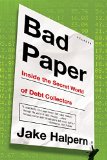Summary | Excerpt | Reviews | Beyond the Book | Read-Alikes | Genres & Themes | Author Bio

Critics' Opinion:
Readers' Opinion:
First Published:
Oct 2014, 256 pages
Paperback:
Oct 2015, 256 pages
 Book Reviewed by:
Book Reviewed by:
Sinéad Fitzgibbon
Buy This Book
This article relates to Bad Paper
In Bad Paper: Chasing Debt from Wall Street to the Underworld, Jake Halpern examines the afterlife of a debt once it has been declared "bad." But is there ever such a thing as a 'good' debt?
What would you do if you won a million dollars? Would you buy that grand house you've always dreamed of? Or the big sports car? Perhaps you'd give to charity or put the money aside for your children's future? We all indulge in daydreams like this from time to time; who among us hasn't thought about the things we could buy if only we could afford them? For the most part, this kind of thinking is nothing more than harmless escapism; a little light relief from the daily grind. Sometimes, however, the line between fantasy and real life can become dangerously blurred.
I have a friend who lived her life in the full expectation that she would win the lottery. The fact that this is a massive statistical improbability did nothing to dent this conviction. It was only a matter of time, she believed, before a multimillion-dollar windfall plopped into her lap. Patience, however, was not her strong suit. So instead of waiting for the money to appear magically in her bank account, she turned to credit. Why worry about those huge bills when something will surely happen, at some point in the future, to improve her financial circumstances? "As long as I'm making the minimum payments," she argued, "there's no problem." "But what will you do if your financial circumstances never improve? How will you repay these huge balances?" I asked one day. She looked at me a little disdainfully. "Don't you know," she replied, "that the best way to live is beyond your means, and the best way to die is mired in debt?'"
As my friend soon discovered, debt has a habit of spiraling out of control. Those minimum monthly repayments, which once seemed so manageable, can soon take up most of your income. And that's when the debt collectors came calling.
What makes debt so attractive to people, especially those who can least afford it? Why do some (otherwise rational) people lose all sense of perspective when it comes to borrowing? One answer, I believe, can be found in the fact that credit cards do not feel like real money. Handing over a plastic card does not have the same psychological impact as parting with a wad of cash. Your wallet, quite simply, does not feel lighter after credit card purchases, so we can sometimes forget that we are spending real money.
Another explanation for our love affair with debt can be traced to our society's growing need for instant gratification. In our fast-paced consumerist world, where the mantra "I want it and I want it now" prevails, the concept of waiting holds little water. Why save for that special something we so desperately want, when we can have it on credit today? Why buy tomorrow what we can have today? That little plastic card offers immediate wish fulfillment while simultaneously delaying the reality of repayment. According to a 2007 research paper by the credit rating company, Experian¸ this tendency to be "financially shortsighted (myopic), favoring more immediate rewards rather than financial benefits in the future, leads to poor economic decision making." And this, of course, is a boon to America's debt collection industry.
In his book, Jake Halpern explains how a lack of regulation has given rise to a host of bad practices within the debt collection industry. The problem is much more fundamental than that, however. Bad financial practices at an individual level are as much to blame as poor regulation. After all, if there were fewer debts, there would be fewer debt collectors, unscrupulous or otherwise. We all have our own individual debt psychology - perhaps we should bear it in mind next time we reach for the plastic fantastic.
Filed under Society and Politics
![]() This "beyond the book article" relates to Bad Paper. It originally ran in November 2014 and has been updated for the
October 2015 paperback edition.
Go to magazine.
This "beyond the book article" relates to Bad Paper. It originally ran in November 2014 and has been updated for the
October 2015 paperback edition.
Go to magazine.





The Flower Sisters
by Michelle Collins Anderson
From the new Fannie Flagg of the Ozarks, a richly-woven story of family, forgiveness, and reinvention.

The House on Biscayne Bay
by Chanel Cleeton
As death stalks a gothic mansion in Miami, the lives of two women intertwine as the past and present collide.

The Funeral Cryer by Wenyan Lu
Debut novelist Wenyan Lu brings us this witty yet profound story about one woman's midlife reawakening in contemporary rural China.
Your guide toexceptional books
BookBrowse seeks out and recommends the best in contemporary fiction and nonfiction—books that not only engage and entertain but also deepen our understanding of ourselves and the world around us.